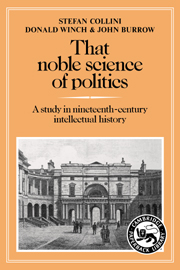Book contents
- Frontmatter
- Contents
- Preface
- PROLOGUE: The governing science: things political and the intellectual historian
- I The system of the North: Dugald Stewart and his pupils
- II Higher maxims: happiness versus wealth in Malthus and Ricardo
- III The cause of good government: Philosophic Whigs versus Philosophic Radicals
- IV The tendencies of things: John Stuart Mill and the philosophic method
- V Sense and circumstances: Bagehot and the nature of political understanding
- VI All that glitters: political science and the lessons of history
- VII The clue to the maze: the appeal of the Comparative Method
- VIII Particular polities: political economy and the historical method
- IX The ordinary experience of civilised life: Sidgwick and the method of reflective analysis
- X A separate science: polity and society in Marshall's economics
- XI A place in the syllabus: political science at Cambridge
- EPILOGUE: A nebulous province: the science of politics in the early twentieth century
- Index
V - Sense and circumstances: Bagehot and the nature of political understanding
Published online by Cambridge University Press: 17 September 2009
- Frontmatter
- Contents
- Preface
- PROLOGUE: The governing science: things political and the intellectual historian
- I The system of the North: Dugald Stewart and his pupils
- II Higher maxims: happiness versus wealth in Malthus and Ricardo
- III The cause of good government: Philosophic Whigs versus Philosophic Radicals
- IV The tendencies of things: John Stuart Mill and the philosophic method
- V Sense and circumstances: Bagehot and the nature of political understanding
- VI All that glitters: political science and the lessons of history
- VII The clue to the maze: the appeal of the Comparative Method
- VIII Particular polities: political economy and the historical method
- IX The ordinary experience of civilised life: Sidgwick and the method of reflective analysis
- X A separate science: polity and society in Marshall's economics
- XI A place in the syllabus: political science at Cambridge
- EPILOGUE: A nebulous province: the science of politics in the early twentieth century
- Index
Summary
Burke first taught the world at large … that politics are made of time and place – that institutions are shifting things, to be tried by and adjusted to the shifting conditions of a mutable world – that, in fact, politics are but a piece of business – to be determined in every case by the exact exigencies of that case: in plain English – by sense and circumstances.
walter bagehot, ‘Letters on the French coup d'état’ (1852)It is, indeed, a peculiarity of our times that we must instruct so many persons … Even if we had a profound and far-seeing statesman, his deep ideas and long-reaching vision would be useless to us, unless we could impart a confidence in them to the mass of influential persons, to the unelected Commons, the unchosen Council, who assist at the deliberations of the nation … It is of no use addressing him with the forms of science, or the rigour of accuracy, or the tedium of exhaustive discussion. The multitude are impatient of system, desirous of brevity, puzzled by formality. They agree with Sydney Smith: ‘Political economy has become, in the hands of Malthus and Ricardo, a school of metaphysics. All seem agreed what is to be done: the contention is, how the subject is to be divided and defined. Meddle with no such matters’ … Such is the taste of mankind.
walter bagehot, ‘The First Edinburgh Reviewers’ (1855).- Type
- Chapter
- Information
- That Noble Science of PoliticsA Study in Nineteenth-Century Intellectual History, pp. 161 - 182Publisher: Cambridge University PressPrint publication year: 1983
- 2
- Cited by



